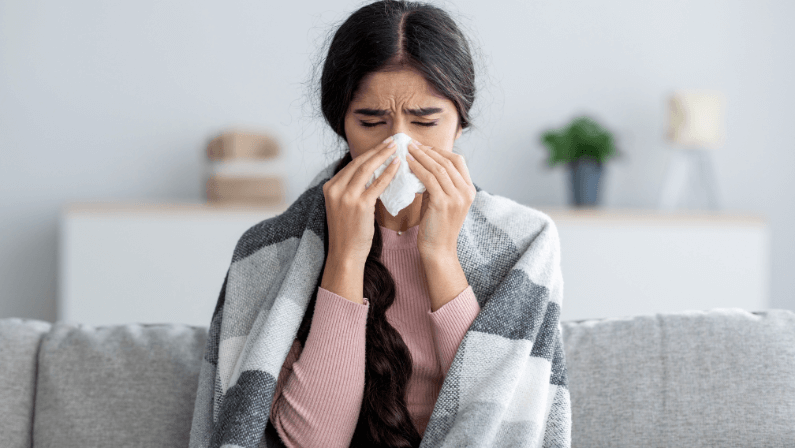When we think of allergic reactions, we typically envision sneezing, itching, or hives. But can allergies also cause a fever? This is a question that puzzles many, especially when they experience a combination of allergy symptoms and elevated body temperature. Understanding the intricate relationship between allergic reactions and fever can help in managing symptoms and determining when it’s time to seek medical attention.
Can Allergies Cause Fever?
Allergies are the immune system’s response to foreign substances, but they do not typically cause a fever. If you have a fever, it’s more likely due to an infection or another cause rather than allergies. However, some allergic reactions can lead to secondary infections such as sinusitis, which may result in fever.
Common Allergic Reactions and Their Symptoms

Allergic reactions are the body’s defense mechanism against what it perceives as threats from certain substances. These reactions can vary widely in their presentation and intensity.
Here’s a more detailed look at common allergic symptoms:
Respiratory Symptoms
Often, allergies trigger respiratory issues such as sneezing, nasal congestion, coughing, wheezing, or difficulty breathing. Asthma attacks can also be precipitated by allergens, particularly for those with allergic asthma.
Skin Reactions
Contact with allergens can lead to a variety of skin issues, including hives, which are red, itchy welts, eczema, which is characterized by dry, itchy skin, and contact dermatitis, which causes a red, itchy rash.
Ocular Symptoms
Allergies frequently affect the eyes, leading to redness, itchiness, and watering, a condition known as allergic conjunctivitis.
Gastrointestinal Symptoms
In some cases, allergies can affect the digestive system, leading to symptoms like abdominal pain, vomiting, or diarrhea, especially in food allergies.
Anaphylaxis
This is a rapid, severe allergic reaction that can affect multiple body systems, leading to symptoms such as swelling of the throat, a severe drop in blood pressure, and fainting. It is a life-threatening emergency that requires immediate medical attention.
Potential Causes of Fever With Allergy-Like Symptoms
Sometimes, what appears to be an allergy could actually be an illness that presents with a fever.
Sinusitis
This infection of the sinuses can cause symptoms similar to allergies, such as nasal congestion and facial pain, along with a fever.
Flu
Influenza can lead to fever, chills, body aches, and other symptoms that overlap with allergic reactions.
Common Cold
The common cold often causes sneezing and congestion, like an allergy, but it can also cause a low-grade fever.
How to Diagnose an Illness vs. Allergies

Determining whether symptoms are due to allergies or an illness is essential because it steers the course of treatment. Allergies and viral or bacterial illnesses often share overlapping symptoms like coughing, nasal congestion, and fatigue, which can make self-diagnosis challenging. However, certain signs and diagnostic tests can help differentiate between the two.
A healthcare provider will consider the entire clinical picture, including a detailed history of symptoms and their duration. Allergies, for instance, are often recurrent and may coincide with exposure to specific triggers like pollen, pet dander, or certain foods. They also typically cause itchiness, which is not a common symptom of infections. On the other hand, fevers, body aches, and green or yellow nasal discharge are more indicative of an infection.
For a definitive diagnosis, several tests might be conducted:
- Blood Tests: A complete blood count (CBC) can indicate an infection if there is an elevated white blood cell count. Specific blood tests can also measure the levels of certain antibodies related to allergic responses.
- Skin Prick Tests: To identify potential allergens, small amounts of common allergens are introduced into the skin, and the area is monitored for a reaction.
- Allergy Blood Tests: These measure the amount of allergy-related antibodies in the bloodstream, specifically Immunoglobulin E (IgE).
- Imaging Tests: Sinus X-rays or CT scans can be useful if sinusitis (a common complication of allergies that can mimic a cold) is suspected.
- Nasal or Sinus Endoscopy: A flexible scope is used to look inside the nasal passages and sinuses for signs of chronic sinusitis.
- Throat and Nasal Cultures: These can identify bacterial infections, which may require antibiotic treatment, differentiating them from allergies.
If allergies are diagnosed, the treatment usually involves avoidance of known allergens and may include antihistamines or nasal corticosteroids. Infections might require antibiotics (if bacterial), antiviral medications, or simply supportive care like rest and fluids if caused by a virus.
Management Of Allergies
Effectively managing allergies involves a multi-faceted approach tailored to the individual’s specific allergens and symptoms. The goal is to minimize the allergic reaction and improve the quality of life.
Here are steps doctors and health professionals typically recommend:
- Avoidance: The cornerstone of allergy management is avoiding triggers. This might mean staying indoors on high pollen days, using dust-mite-proof bedding, or eliminating certain foods from your diet.
- Medications: Over-the-counter antihistamines can relieve sneezing, itching, and runny nose, while decongestants help with nasal congestion. Nasal corticosteroids are widely regarded as the most effective allergy medications for persistent symptoms, and they work best when used daily.
- Prescription Medications: For those with severe allergies, prescription medications such as leukotriene modifiers or stronger corticosteroids may be necessary.
- Immunotherapy: For long-term relief, allergen immunotherapy, which gradually desensitizes the immune system to specific allergens, can be beneficial. This can be administered through allergy shots or sublingual tablets.
- Lifestyle Modifications: Simple changes like showering after being outdoors to remove allergens, using high-efficiency particulate air (HEPA) filters, or using a saline nasal rinse can significantly reduce symptoms.
- Emergency Plan: For those at risk of severe allergic reactions, having an emergency action plan and carrying an epinephrine auto-injector at all times is critical.
- Vitamin Infusions for Flu Season: Setting itself apart from other emergency rooms, Silver Lake ER offers vitamin infusions for preventive care. This is an effective way to boost the immune system during the flu season. These infusions can help replenish essential vitamins and minerals, potentially reducing the duration and severity of flu symptoms and providing overall immune support.
When to Contact a Doctor

While many allergies can be managed at home, there are certain circumstances where medical advice should be sought:
- New or Worsening Symptoms: If you’re experiencing new allergy symptoms or if your symptoms are worsening despite treatment, a consultation with a healthcare provider can help adjust your management plan.
- Fever: Allergies typically don’t cause fevers. If you have allergy symptoms with a fever, it could be a sign of an infection or another health issue.
- Anaphylaxis: Immediate medical attention is critical if you experience any signs of anaphylaxis, which may include trouble breathing, a rapid drop in blood pressure, dizziness, or swelling of the face and throat. Anaphylaxis is a medical emergency.
- Chronic or Recurrent Infections: Allergies can lead to complications such as chronic sinus infections. Seeking medical care can help prevent or treat these conditions.
Effective allergy management and recognizing when to seek professional care are key to living comfortably with allergies. Whether it’s adjusting your treatment plan or addressing complications, a healthcare provider can offer the necessary support and guidance.
The Role of Expert Care in Managing Allergic Reactions and Fevers
When allergies and fevers intersect, the guidance of medical experts is key to effective management. Residents of Pearland, TX, can find solace in the high-quality care provided by Aether Health – SilverLake ER. Our facility is designed with your health in mind, featuring advanced technology and a team of dedicated healthcare professionals ready to address urgent medical needs.
Whether you’re facing a complex allergic reaction or an unexplained fever, Aether Health – SilverLake ER is prepared to deliver prompt and thorough care. We understand the importance of addressing your concerns quickly, which is why our doors are open for efficient emergency treatment, focusing on personalized patient care. If you’re not feeling well due to allergies or fevers, check in Aether Health – SilverLake ER today and get expert attention and treatment immediately.








